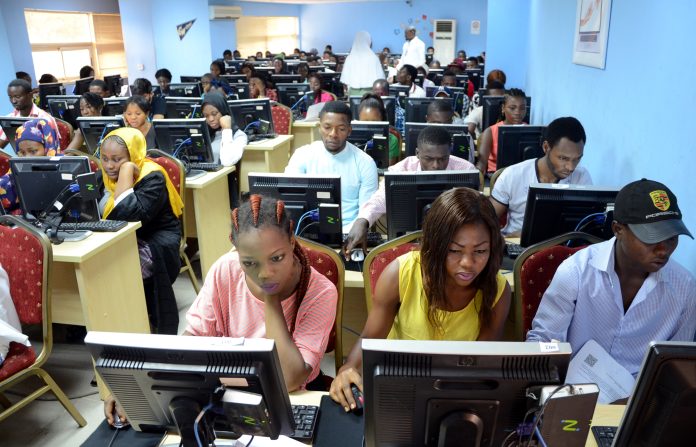
Another call has gone to governments at various levels in the country to take a cue from the Joint Admissions and Matriculation Board (JAMB) by exploring alternative sources of funding for their activities through the establishment of Mega CBT centres.
The call was made by the Gombe State Coordinator, Mr. Johnson Adebiyi, during his courtesy visit to the Executive Governor, Gombe State, Muhammad Inuwa Yahaya. The meeting, which was at the instance of the State Government, was attended by critical stakeholders in the State’s educational sector as well as members of the committee constituted by the Governor to seek collaboration with the Board in the establishment of Mega CBT centres. The meeting was held at the Office of the Gombe State Commissioner of Education, Gombe, on Monday, 12th August, 2024.
In her opening remarks, the Gombe State Commissioner of Education, Dr. Aishatu Umar Maigeri, welcomed the State Coordinator and his team and informed him that the meeting was sequel to the support he solicited from the State Government on his assumption of office as the State Coordinator to establish a Mega CBT centre in the State. She commended the current leadership of the Board for its various achievements and expressed the readiness of the State Government to support the Board’s activities in the State as well as leverage on other areas of competences of the Board.
In his paper presentation titled: “The Contributions of CBT Centres to National Development in Nigeria” the State Coordinator gave historical perspectives on how CBT was birthed in the Board. He noted that various challenges such as examination malpractice, among others, in the Paper and Pencil Testing (PPT) prompted the Board to switch to Computer-Based Testing (CBT) in 2013.
According to Adebiyi, the switch in the mode of testing brought about a number of challenges especially with regard to the issue of inadequate CBT centres to accommodate the teeming numbers of UTME candidates yearly.
He stressed that the resources needed to build adequate number of centres was beyond the capacity of the Board, hence, the Board had to enter into Public Private Partnership (PPP) to bridge the infrastructural gap. He added that with minimal number of centres at the inception of the CBT, there are currently over seven hundred (700) accredited CBT centres nationwide.
Continuing, the State Coordinator, however, disclosed that the inadequate number of CBT centres that had hitherto been a source of weakness to the Board had been turned into one of opportunity as the development of such edifice could be leveraged upon as an alternative source of funding. He pointed out that many institutions of learning, public and private organisations have also keyed into the idea of establishing Mega CBT centres owing to its numerous advantages.
He further revealed that apart from improved productivity, cost effectiveness and credibility of the UTME conducted therein, CBT centres have also contributed to national development in Nigeria by providing individuals with basic means of livelihood.
Furthermore, Adebiyi explained that the establishment of CBT centres would not only boost the ICT skills of students but can also be used to attract Internally-Generated Revenue (IGR) to the State Government especially from the conduct of UTME and other Board’s third-party examinations such as recruitment, promotion, and scholarship examinations, as well as fostering the day -to-day activities of the Board.
He disclosed further that the holding halls of CBT centres can also be used as training venues for skill acquisition programmes to stimulate the growth of small-scale enterprises so as to reduce youth unemployment and promote self-sustenance and self-reliance among the populace.
He added that the facilities should not be allowed to remain idle as they can as well serve as event centres for social activities like weddings, birthdays, meetings for socio-cultural groups, among others.
Speaking further, he stated that well-equipped CBT centres could be leveraged upon as a technical hub and innovation centre in the State, where many businesses related to technology could collaborate to facilitate cross-pollination of ideas, enabling individuals and organisations to exchange ideas, share knowledge, and form partnerships.
The Coordinator concluded that CBT centres play an important role in creating new jobs, new sources of income, improving digital and entrepreneurial skills, and by extension, national development in Nigeria.
In her closing remarks, Dr. Maigeri thanked the Coordinator for his insightful presentation and promised the readiness of the State Government to synergise with the Board to upgrade its existing computer centres to Mega CBT centres across the State.
On the entourage of the State Coordinator, were some notable staff of the State Office, among whom were: Mr. Mubarak Sani Aliyu, Mr. Idris Jungudo, and Mr. Umar Muhammed.













